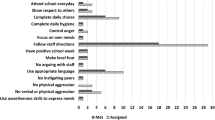Abstract
This article reports on a training program for group home supervisors that was designed to utilize positive youth development principles in work with youth transitioning from care to independent living. Over a period of 5 months, eight one-day training sessions took place across one state in the U.S. (Massachusetts) with a total of 186 group care staff in attendance. The evaluation consisted of three components: observation of participant feedback during training, training day post-test, and follow-up with participants 2–3 months after training. Implications of the data, particularly barriers to implementation of training programs, are discussed.
Similar content being viewed by others
References
Amodeo, M., & Collins, M. E. (2007). Applying positive youth development principles in practice with youth with problem behaviors. Families in Society: The Journal of Contemporary Human Services, 88(1), 75–85.
Batavick, L. (1997). Community-based family support and youth development: Two movements, one philosophy. Child Welfare, LXXVI, 639–663.
Catalano, R. F., Hawkins, D., Berglund, L. M., Pollard, J. A., & Arthur, M. W. (2002). Prevention science and positive youth development: Competitive or cooperative frameworks? Journal of Adolescent Health, 31, 230–239.
Community Network for Youth Development. (2007). Retrieved May 15, 2007 from http://www.cnyd.org/framework/index.php.
Costello, J., Toles, M., Spielberger, J., & Wynn, J. (2001). How history, ideology, and structure shape the organizations that shape youth. In P. Benson & K. Pittman (Eds.), Trends in youth development: Visions, realities, and challenges. Boston: Kluwer Academic.
Curry, D., Caplan, P., & Knuppel, J. (1994). Transfer of training and adult learning (TOTAL). Journal of Continuing Social Work Education, 6(1), 8–14.
Curry, D., McCarragher, T., & Dellman-Jenkins, M. (2005). Training, transfer, and turnover among transfer of learning factors and staff retention in child welfare. Children and Youth Service Review, 27, 931–948.
Gregoire, T. K., Propp, J., & Poertner, J. (1998). The supervisor’s role in the transfer of training. Administration in Social Work, 22, 1–18.
Huebner, A. J., Walker, J. A., & McFarland, M. (2003). Staff development for the youth development professional: A critical framework for understanding the work. Youth & Society, 35, 204–225.
Mitchell, S., White, A., Wynn, S. W., & Pecora, P. J., (1989). Counseling troubled adolescents: An evaluation of a statewide training program. Journal of Sociology and Social Welfare, 16, 95–108.
National Collaboration for Youth Members. (1998). Retrieved October 15, 2002 from http://www.nydic.org.
Pittman, K., Irby, M., & Ferber, T. (2001). Unfinished business: Further reflections on a decade of promoting youth development. In P. Benson & K. Pittman (Eds.), Trends in youth development: Visions, realities, and challenges. Boston: Kluwer Academic.
Robertson, R. M. (1997). Walking the talk: Organizational modeling and commitment to youth and staff development. Child Welfare, LXXVI, 577–589.
Roth, J. L., & Brooks-Gunn, J. (2003). Youth development programs: Risk, prevention, and policy. Journal of Adolescence, 32, 170–182.
Author information
Authors and Affiliations
Corresponding author
Rights and permissions
About this article
Cite this article
Collins, M.E., Hill, N. & Miranda, C. Establishing Positive Youth Development Approaches in Group Home Settings: Training Implementation and Evaluation. Child Adolesc Soc Work J 25, 43–54 (2008). https://doi.org/10.1007/s10560-008-0111-7
Received:
Accepted:
Published:
Issue Date:
DOI: https://doi.org/10.1007/s10560-008-0111-7




